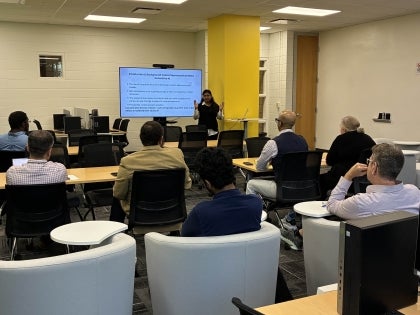Information Systems
Address details
Mailing Address
Cleveland State University
Monte Ahuja College of Business
2121 Euclid Avenue, BU 344
Cleveland, OH 44115-2214
information_systems@csuohio.edu
Campus Location
Monte Ahuja Hall, Room 344
1860 E. 18th Street
Cleveland, OH 44114
Phone: 216-687-4760
information_systems@csuohio.edu
Webmaster
Department Instagram £
IS Research Seminar
Unveiling the Role of AI in Project Scheduling: Opportunities and Challenges
Kasun Wijayagurusinghe, DBA Student in Information Systems
Christopher Wimer, DBA Student in Marketing
Apo Oguz, Assistant Professor in Information Systems
Date: Oct. 1, 2025 Wednesday;11:30 am - 12:30 pm,
Location: BU 04B
Abstract: Much attention has recently been given to the potential for AI to revolutionize many aspects of work due to its capabilities. Despite this interest, however, a collective view of the broad ways in which AI can influence aspects of a specific area of work has yet to receive much study in the existing literature. In this study, a qualitative thematic analysis approach is used to better understand how adopting and implementing AI technologies in the field of project scheduling are perceived as leading to major changes in this area of work. From this analysis, AI is shown to have an impact on project scheduling through its abilities to both enhance and optimize processes within this area, but further research is needed to better understand how to successfully integrate AI into a workplace as well as the various implications which arise from incorporating AI into a given area of work.
Keywords: Artificial Intelligence, Project Management, Project Scheduling, Thematic Analysis
From Zero to One: How AI Solo Entrepreneurs Leverage Generative AI for Business Growth
Shradha Shinde, DBA-IS Student
Shih-Lun Tseng (Allen), Assistant Professor in Information Systems
Iftikhar Sikder, Associate Professor in Information Systems
Date: September 11th Thursday 11:30 - 12:30
Location: BU 04B - IS Team Lab

Abstract: Generative Artificial Intelligence (Gen AI) is rapidly emerging as a powerful and vital technological force shaping modern digital workspaces. This study focuses on how solo entrepreneurs, individuals operating without co-founders or large teams, can harness Gen AI tools to progress from ideation to full-scale business development. The research investigates whether Gen AI can serve as a viable enabler for launching, scaling, and sustaining digital ventures without traditional human capital dependencies. To achieve this, we explore four core research questions:
(1) What defines a solo AI entrepreneur and what are their unique characteristics and work dynamics?
(2) What are the critical processes, success factors, and obstacles involved in launching and scaling solo-led ventures?
(3) How do the challenges and opportunities for solo entrepreneurs differ from those in conventional tech startups?
(4) How can specific Gen AI tools support or transform each stage of solo entrepreneurial development?
Grounded in a mixed-methods design, the study is structured in two phases. Phase 1 involves an observational content analysis of over 80 short-form videos across platforms such as Instagram, LinkedIn, and YouTube, where we identify, categorize, and evaluate Gen AI tools using a CIPP-based framework aligned with entrepreneurial stages. Phase 2 implements a controlled observational experiment simulating a solo startup sprint with student participants, allowing for empirical testing of Gen AI’s impact on entrepreneurial outcomes.
By integrating both qualitative and quantitative insights, this research aims to determine whether Gen AI tools can enable solo entrepreneurs to convert early-stage ideas into scalable digital businesses. The study contributes to the emerging dialogue at the intersection of entrepreneurship and artificial intelligence by proposing a tool-task-stage mapping framework and offering theoretical insights for future research and practice.
Address details
Mailing Address
Cleveland State University
Monte Ahuja College of Business
2121 Euclid Avenue, BU 344
Cleveland, OH 44115-2214
information_systems@csuohio.edu
Campus Location
Monte Ahuja Hall, Room 344
1860 E. 18th Street
Cleveland, OH 44114
Phone: 216-687-4760
information_systems@csuohio.edu
Webmaster
Department Instagram £